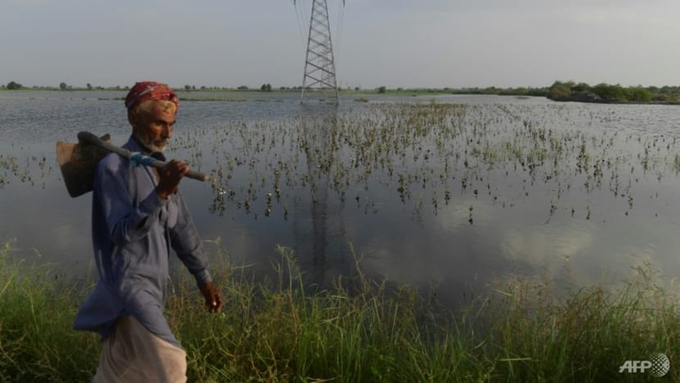November 28, 2025 | 04:04 GMT +7
November 28, 2025 | 04:04 GMT +7
Hotline: 0913.378.918
November 28, 2025 | 04:04 GMT +7
Hotline: 0913.378.918

More than 33 million people have been affected by the floods caused by record monsoon rains, and one of the worst-hit areas is Sindh in Pakistan's south.
"We have gone back 50 years," said Ashraf Ali Bhanbro, a farmer in Sindh province whose 2,500 acres of cotton and sugarcane - on the verge of being harvested - have now been wiped out.
More than 33 million people have been affected by the floods caused by record monsoon rains, and one of the worst-hit areas is Sindh in Pakistan's south.
The province is bisected by the mighty Indus River, along whose banks farming has flourished for millennia with records of irrigation systems dating back to 4,000 BC.
Sindh's problems are two-fold.
The province was drenched by record rains locally, but that water has nowhere to drain because the Indus is already at full flow, swollen by tributaries in the north, and has burst its banks in several places.
"At one stage it rained continuously for 72 hours," said Bhanbro, adding he has lost at least 270 million rupees (US$1.2 million) on inputs alone.
"That was the cost incurred on fertilisers and pesticides ... we don't include profit, which might have been much higher as it was a bumper crop."
Unless flooded farmlands can be drained, farmers like Bhanbro will not be able to plant a winter wheat crop - vital for the country's food security.
"We have one month. If water is not discharged in that period, there will be no wheat," he said at his farm in Sammu Khan village, about 40km northeast of Sukkur.
Pakistan was for years self-sufficient in wheat production, but more recently has relied on imports to ensure silos are full as part of its strategic reserves.
PAKISTAN OWES BILLIONS
Islamabad can scarcely afford imports - even if it purchases discounted grain from Russia, as is being discussed.
The country owes billions to foreign creditors, and only last week managed to convince the International Monetary Fund to resume funding that can't even service foreign debt, let alone pay a flood-damage bill estimated at US$10 billion.
Driving along an elevated highway from Sukkur to Sammu Khan provides a shocking view of the devastation wrought by the floods.
In some places there is water as far as the eye can see; where cotton crops are visible in flooded fields, their leaves have turned brown, with hardly a boll to be seen.
"Let's forget the cotton," said Latif Dinno, a farmer in Saleh Pat, 30KM northeast of Sukkur.
The big landowners will likely ride out the floods, but tens of thousands of farm labourers face terrible hardships.
Many only get paid for what they pick, and supplement their earnings by growing food on tiny plots of land in villages scattered across the province.
Those too are under water, and tens of thousands have fled their flooded homes to seek shelter on higher ground.
"There is nothing left to pick," said Saeed Baloch, who labours every season with members of his extended family, pooling their earnings.
It's not just the farmers that are affected, but every link in the supply chain is feeling the strain.
"We are doomed," said Waseem Ahmed, a cotton trader in Saleh Pat, who like many in the industry paid advances to fix purchase prices and hedge against inflation and market fluctuation.
"Against 200 maund (about 8,000 kg) expected, only 35 maund has been reaped," he said, adding he had shelved plans to expand his business.
At a small collection store in a usually vibrant cotton market in Sindh, two boys poked half-heartedly at a heap of wet cotton, checking to see if anything could be salvaged.
"The market is shut down and even the ginning factories are closed," trader Ahmed said, pointing to a row of closed shops.
The sense of helplessness is overwhelming, but cotton picker Dinno hopes for divine intervention.
"We look up to Allah. He is the ultimate saviour," he said.
(AFP)

(VAN) A new study reveals how the simultaneous effects of ocean acidification, salinity and loss of oxygen are making the world more fragile.

(VAN) Hopes are growing that the creation of the first 3D turkey gut model could be a turning point in the battle against the virulent blackhead disease.

(VAN) Tyson, America’s biggest meat supplier, plans to shutter one of its largest beef processing plants as the industry continues to struggle with low cattle supplies and political pressure from Washington.

(VAN) New FAO study shows how digital solutions are empowering farmers and fishers to prevent losses and build resilient agrifood systems.

(VAN) Brazil's COP30 presidency pushed through a compromise climate deal on Saturday that would boost finance for poor nations coping with global warming but that omitted any mention of the fossil fuels driving it.

(VAN) Poultry farmers in the UK have been warned that they could face one of the worst winters yet for bird flu.

(VAN) Prices of main-crop paddy have risen sharply, with jasmine rice hitting 16,100 baht per tonne — the highest level in years.